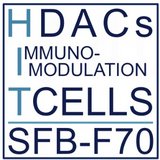HIT: HDACs – Immunomodulation – T cells
The special research program (SFB) “HDACs as regulators of T cell-mediated immunity in health and disease” is a research network funded by the Austrian Science Fund. The SFB has been establish in 2019 and is currently in its 2nd funding period (2023-2027). It is formed by an interdisciplinary consortium of nine research groups, of which eight are located in Vienna and one in Salzburg.
HDACs are key epigenetic and genetic regulators during development and cell differentiation. HDACs control the acetylation status of histones and non-histone proteins, thus modulating chromatin function and the activity of non-histone protein targets, respectively. Pan-HDAC inhibitors (HDACi) are clinically used for the treatment of certain cancers. Preclinical data indicate that HDAC modulation is beneficial for the therapy of T cell-mediated diseases, although the use of existing pan-HDACi for these indications is limited by their side effects. We hypothesize that the usage of subclass-specific and/or isoform-selective HDACi will avert limiting side effects and thereby broaden the clinical application spectrum of HDACi far beyond cancer. The overall aim of this 8-year SFB research program and consortium is to obtain an in-depth mechanistic understanding of HDAC function in T cells and to test essential regulatory roles of reversible lysine acetylation beyond histone modifications and epigenetic gene regulation in Th cells. With this we will be able to provide a mechanistic molecular rationale for the application of isoform-selective HDACi for the treatment of T cell-mediated diseases as well as to identify and characterize HDAC target genes and target proteins as novel drug targets.



